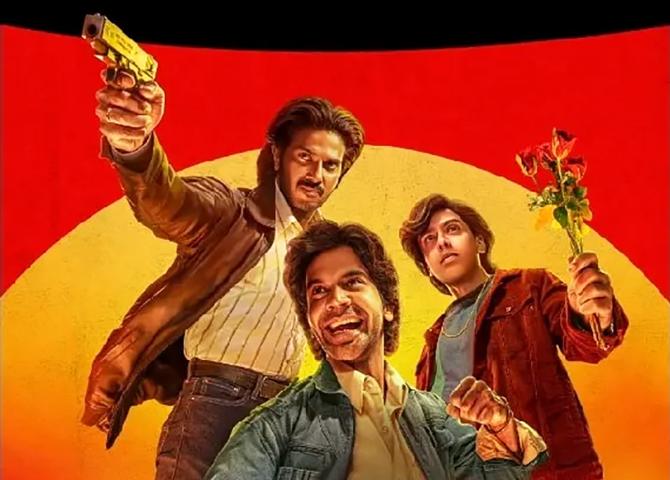Rajkummar Rao and Adarsh Gourav get into the nutty mode easily and carry off the dark comedy without overacting, while Dulquer Salmaan looks bored, observes Deepa Gahlot.

The cars are Ambassadors and Fiats, the phones are rotary, there are STD phone booths with LCD panels displaying call duration, cassette players and tapes are still around blaring Kumar Sanu and Bryan Adams.
Lending libraries have novels by almost forgotten authors like Desmond Bagley and Irving Wallace.
It's late 1980s and early 1990s nostalgia seeping of the otherwise generic north Indian town overrun by gangs.
Why this kind of Web show has not caused fatigue among film-makers and audiences is a mystery.
Raj and DK's Guns and Gulaabs (hat tip to the band Guns and Roses) is set in an opium-growing region, divided between two rival gangs -- one run by Ganchi (Satish Kaushik) in Gulaabganj and the other by Nabeed (Nilesh Divekar) in Sherpur.
The local dhaba has drawn a line across its seating area and the gangsters are expected to keep to their side.
Caught up in the mayhem between the gangs is a mechanic, Tipu (Rajkummar Rao), whose only ambition is to own his own bike repair shop, and perhaps win the affection of the moped-riding school teacher Lekha (TJ Bhanu).
The eight-part series starts with the murder of Tipu's father by a hired assassin, Atmaram (Gulshan Devaiah), who is known as 'Char Cut' because he stabs his victims four times, and the body count grows by the end.
Ganchi is about to close a big deal with a Calcutta drug cartel when he has a fall and ends up in a coma.
His son Jugnu (Adarsh Gourav) wants to prove that he is a worthy successor, and starts forcing the legitimate opium cultivators (who supply to the government) to sell to him, as Nabeed tries to butt in.
The superintendent of police, Mishra (Jogi Malang) is on Ganchi's payroll but newly appointed narcotics officer Arjun (Dulquer Salmaan) has his own agenda.
Interspersed between the gang wars is a school puppy love triangle, with Lekha as the object of two students' romantic dreams.
Arjun's daughter Jyotsna (Suhani Sethi) becomes the class topper and the object of cheap graffiti on the town's wall as the boys squabble. This kiddie party is just a diversion when the opium wars hit another dead end.
There is not much novelty to the plot, which the directors (co-writers with Suman Kumar and Sumit Arora) cover with a jokey kind of violence (Quentin Tarantino and Guy Ritchie seem to be the inspiration) that had turned Pulp Fiction into a cult movie.
Atmaram, with that unfortunate mullet once popularised by Sanjay Dutt, is reputed to be indestructible like a cat with nine lives.
Lekha rejects Tipu for being too simple but her eyes light up when she discovers that he killed two men with a spanner.
A macho killer is obviously more desirable than a sweet wimp, who hires a school boy to write an English love letter for him, with comic consequences.
Individual scenes spark with dots of humour but the show keeps running over the same Calcutta deal track till it wears out.
By the time the last two 'chapters' are reached (they are all given cute titles), which are combined to form one long episode, in which there are flashbacks and forwards, explanations that were really not required and a predictable shootout climax, the only thing that comes as a surprise is the twist at the end.
Arjun must be the dullest screen cop ever, and Dulquer Salmaan looks bored with the proceedings. The actor who plays his sidekick Ramprasad (Sachin Kathuria) shows a better range of expressions.
Rajkummar Rao and Adarsh Gourav get into the nutty mode easily and carry off the dark comedy without overacting.
Pooja Gor as the cop's wife and Shreya Dhanwanthary as his 'honeytrap' have minuscule token female roles in this macho 'goti'-obsessed universe.
The best part of the series is the imaginatively done end credits.
Guns And Gulaabs streams on Netflix.

- MOVIE REVIEWS

